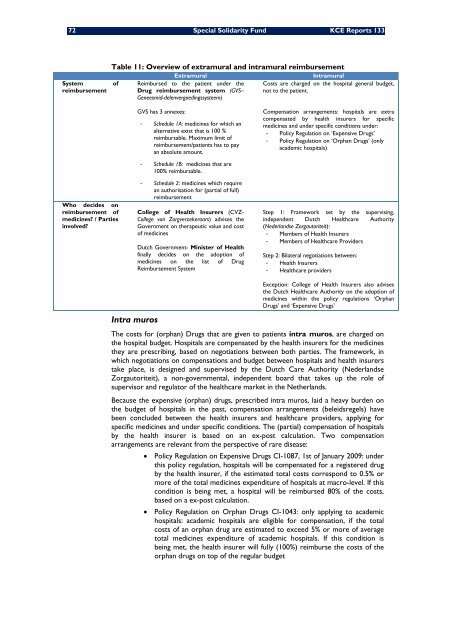Optimalisatie van de werkingsprocessen van het Bijzonder ... - KCE
Optimalisatie van de werkingsprocessen van het Bijzonder ... - KCE
Optimalisatie van de werkingsprocessen van het Bijzonder ... - KCE
Create successful ePaper yourself
Turn your PDF publications into a flip-book with our unique Google optimized e-Paper software.
72 Special Solidarity Fund <strong>KCE</strong> Reports 133<br />
System of<br />
reimbursement<br />
Who <strong>de</strong>ci<strong>de</strong>s on<br />
reimbursement of<br />
medicines? / Parties<br />
involved?<br />
Table 11: Overview of extramural and intramural reimbursement<br />
Intra muros<br />
Extramural Intramural<br />
Reimbursed to the patient un<strong>de</strong>r the<br />
Drug reimbursement system (GVS–<br />
Geneesmid-<strong>de</strong>lenvergoedingssysteem)<br />
GVS has 3 annexes:<br />
- Schedule 1A: medicines for which an<br />
alternative exist that is 100 %<br />
reimbursable. Maximum limit of<br />
reimbursement/patients has to pay<br />
an absolute amount.<br />
- Schedule 1B: medicines that are<br />
100% reimbursable.<br />
- Schedule 2: medicines which require<br />
an authorisation for (partial of full)<br />
reimbursement<br />
College of Health Insurers (CVZ-<br />
College <strong>van</strong> Zorgverzekeraars) advises the<br />
Government on therapeutic value and cost<br />
of medicines<br />
Dutch Government- Minister of Health<br />
finally <strong>de</strong>ci<strong>de</strong>s on the adoption of<br />
medicines on the list of Drug<br />
Reimbursement System<br />
Costs are charged on the hospital general budget,<br />
not to the patient.<br />
Compensation arrangements: hospitals are extra<br />
compensated by health insurers for specific<br />
medicines and un<strong>de</strong>r specific conditions un<strong>de</strong>r:<br />
- Policy Regulation on ‘Expensive Drugs’<br />
- Policy Regulation on ‘Orphan Drugs’ (only<br />
aca<strong>de</strong>mic hospitals)<br />
Step 1: Framework set by the supervising,<br />
in<strong>de</strong>pen<strong>de</strong>nt Dutch Healthcare Authority<br />
(Ne<strong>de</strong>rlandse Zorgautoriteit):<br />
- Members of Health Insurers<br />
- Members of Healthcare Provi<strong>de</strong>rs<br />
Step 2: Bilateral negotiations between:<br />
- Health Insurers<br />
- Healthcare provi<strong>de</strong>rs<br />
Exception: College of Health Insurers also advises<br />
the Dutch Healthcare Authority on the adoption of<br />
medicines within the policy regulations ‘Orphan<br />
Drugs’ and ‘Expensive Drugs’<br />
The costs for (orphan) Drugs that are given to patients intra muros, are charged on<br />
the hospital budget. Hospitals are compensated by the health insurers for the medicines<br />
they are prescribing, based on negotiations between both parties. The framework, in<br />
which negotiations on compensations and budget between hospitals and health insurers<br />
take place, is <strong>de</strong>signed and supervised by the Dutch Care Authority (Ne<strong>de</strong>rlandse<br />
Zorgautoriteit), a non-governmental, in<strong>de</strong>pen<strong>de</strong>nt board that takes up the role of<br />
supervisor and regulator of the healthcare market in the Netherlands.<br />
Because the expensive (orphan) drugs, prescribed intra muros, laid a heavy bur<strong>de</strong>n on<br />
the budget of hospitals in the past, compensation arrangements (beleidsregels) have<br />
been conclu<strong>de</strong>d between the health insurers and healthcare provi<strong>de</strong>rs, applying for<br />
specific medicines and un<strong>de</strong>r specific conditions. The (partial) compensation of hospitals<br />
by the health insurer is based on an ex-post calculation. Two compensation<br />
arrangements are rele<strong>van</strong>t from the perspective of rare disease:<br />
• Policy Regulation on Expensive Drugs CI-1087, 1st of January 2009: un<strong>de</strong>r<br />
this policy regulation, hospitals will be compensated for a registered drug<br />
by the health insurer, if the estimated total costs correspond to 0.5% or<br />
more of the total medicines expenditure of hospitals at macro-level. If this<br />
condition is being met, a hospital will be reimbursed 80% of the costs,<br />
based on a ex-post calculation.<br />
• Policy Regulation on Orphan Drugs CI-1043: only applying to aca<strong>de</strong>mic<br />
hospitals: aca<strong>de</strong>mic hospitals are eligible for compensation, if the total<br />
costs of an orphan drug are estimated to exceed 5% or more of average<br />
total medicines expenditure of aca<strong>de</strong>mic hospitals. If this condition is<br />
being met, the health insurer will fully (100%) reimburse the costs of the<br />
orphan drugs on top of the regular budget

















